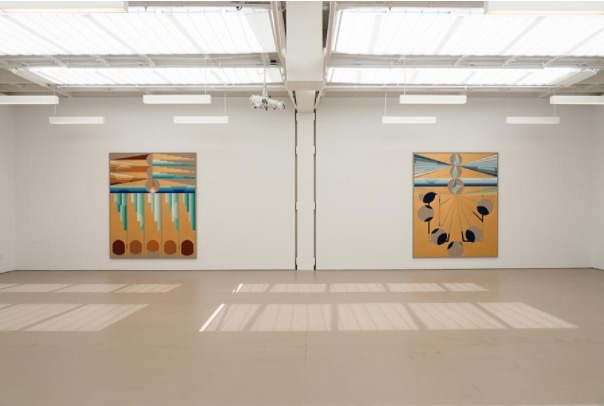Eamon Ore-Giron in Frieze Magazine

BY NATASHA BOAS
At Friends Indeed, San Francisco, the artist mines European and indigenous American sources to form a new abstract language.
On a recent foggy San Francisco afternoon, I made my way through empty streets to Friends Indeed gallery for my first in-person encounter with art since the beginning of the COVID-19 lockdown. Visually and psychologically disoriented, I stood before four large, vertical, abstract paintings in richly pigmented flashe on earthen linen by the artist Eamon Ore-Giron. As the works glowed golden beneath a skylight, I had the distinct sensation of having entered a sanctuary.
The Los Angeles-based, Tucson-born Ore-Giron, who is of Peruvian and Irish-American descent, has been losing the vision in his right eye for over a decade, and attributes his working in flat, constructivist planes to this condition. He describes his paintings as ‘heuristic’ – consisting of simple visual codes that can be deciphered in a number of ways by the viewer. These codes run throughout his multidisciplinary practice, which includes painting, video, performance and music production.
The works on display at Friends Indeed are part of ‘Infinite Regress’ (2015–ongoing), an iterative series comprising (to date) 130 paintings of circles and triangles in earthy or celestial hues radiating gold. These forms abstract a variety of visual references, including South American textiles, Egyptian hieroglyphics, indigenous architecture and astral charts. The exhibition is titled ‘Conspirateurs’ after an 18th-century French board game in which players move marbles around a grid to reach ‘sanctuary’. Two of the paintings incorporate steps and arches that directly allude to the architecture of Inca temples. In Infinite Regress CXVIII (2020), perhaps the strongest of the four paintings, a series of circles in sky and ocean blues, arranged around lines of untreated canvas against a field of gold, seems to echo the pyramidal composition of Leonardo da Vinci’s Madonna of the Rocks (1483–86), as though an abstract Virgin Mary has materialized at the foot of the Andes, surrounded by sacred Apu mountain spirits.
The geometric precision and radiant colours of the works in ‘Conspirateurs’ draw from indigenous Peruvian design, Californian psychedelia and Brazilian neo-concretism, as well as the paintings of Uruguayan modernist Joaquín Torres-García, who founded his Taller Torres-García workshop in 1943 with the primary objective of developing a distinctly Latin American artistic language. As its 1939 manifesto proclaimed, ‘Our North is the South.’ Like the artists of Taller Torres-García, Ore-Giron is also addressing art historical bias towards the Western canon. However, rather than promoting a counter-narrative, Ore-Giron quotes from multiple sources – across eras, genres and geographies – envisioning a transverse history of cultural exchange in the Americas.
In philosophy, infinite regress refers to a sequence of reasoning without end, in which one proposition leads to another. Each painting in Ore-Giron’s ‘Infinite Regress’ series is, likewise, formally contingent on the last. Similarly, as his alter ego DJ Lengua, the artist might overlay samples of sonidero music with US pop and folk during the course of a performance, creating syncretic beats that transcend cultural divisions. The space this opens up is the sanctuary I entered, where north is south and south is north, and everyone is a co-conspirator.
Eamon Ore-Giron, ‘Conspirateurs’ is on view at Friends Indeed, San Francisco, until 14 August 2020.